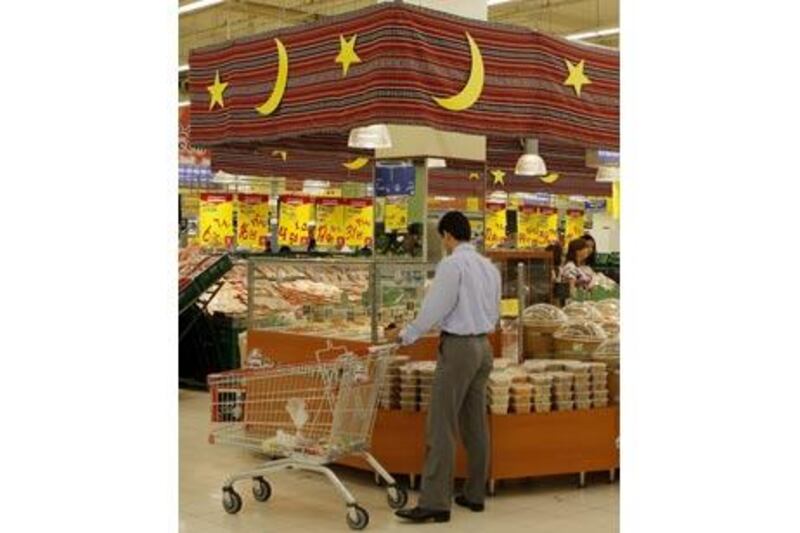ABU DHABI // Although nearly two-thirds of Muslims in the UAE believe the country was more devout in the past than it is now, a survey carried out for The National to mark the end of Ramadan shows that for the vast majority of the nation's Muslims, spirituality remains the most important aspect of the holy month.
During Ramadan, 70 per cent of Muslims prayed more; 69 per cent performed Taraweeh, either at home (21pc) or at the mosque (48pc); and 61 per cent read the entire Quran, with 17 per cent staying up late to do so, according to the survey. It may seem a contradiction in terms of statistics, but one that sits comfortably in terms of the complexities of modern living, according to Muhammed Ayish, a professor of communication at the University of Sharjah and a regular commentator on Islamic issues.
The apparent disparity in the survey highlights the distinction between culture and religion, he said. "People always associate conservatism with religion, but it is not accurate. They assume that because previous generations were more restricted in terms of lifestyle, dress and social habits, then they were more religious, but this is not necessarily the case. People can still be devout while living a modern life."
Earlier this year, he said, a Gallup Poll appeared to find that Egyptians were the world's most religious people. "These findings were because 100 per cent of the Egyptian population said religion played an important role in their daily lives and because the churches and the mosques were regularly full," he said. "But at the time many questioned how such high levels of religiosity corresponded to problems in Egyptian society.
"It came down to the difference between religion and culture, and it is the same here." Furthermore, he said, most people in the UAE are expatriates, and "they can't comment on how life was in the past here, especially not on the levels of religiosity. "Just because the world has become more modern with media, communications and technology it doesn't mean people are less devout. It just means their style and practice is different."
The UAE scored "very highly" in preliminary findings of the Shariah Index Project, launched in July to rate nations according to how closely they adhere to Islamic principles, said Imam Feisal Abdul Rauf, a New York-based cleric who heads the Cordoba Initiative, a multinational project to improve relations between Muslim countries and the West. "People always look to the past and think of it as a time when people were better," he said.
"My grandpa used to say 'We're close to the end of time.' I think people have a tendency to think of the past as tradition eroding; it's a romanticised idea of their youth." The survey for The National was carried out on September 7-9 by the UAE branch of YouGov, the international research organisation. Of the 897 respondents, 61 per cent were Muslim, 18 per cent were Christian and 15 per cent were Hindu.
Almost all (95 per cent) of the Muslims interviewed said they fasted throughout Ramadan; the other five per cent said they were prevented from doing so by medical conditions or other reasons. Asked to pick the two things they liked most about the month, more than three-quarters of the Muslims (78 per cent) said it was feeling closer to God, while 42 per cent nominated the spirit of giving and sharing.
"The finding that spirituality remains the most important aspect of the holy month suggests a true understanding of the essence of Ramadan as a spiritual experience," Dr Ayish said. "I think the permeation of this view of Ramadan among a majority of respondents reflects healthy attitudes and practices pertaining to fasting as a religious ritual." Charity played a significant part in the lives of many Muslims during Ramadan, expressed through giving money (62 per cent), food (42 per cent) or clothes (25 per cent) to those in need.
"The practice of charity also shows that Ramadan is not only about spirituality, but also about carrying out concrete actions for the good of the community," said Dr Ayish. The survey also found: @Body-Bullets:?78 per cent of Muslims said they tried not to listen to music during Ramadan, with 51 per cent feeling strongly about this. For 16 per cent, not listening to music was not seen as important part of Ramadan.
?89 per cent had no plans to undertake Umrah this Ramadan, but eight per cent were planning to visit Mecca and three per cent said they had already visited. ?Only five per cent of Muslims were bothered by the lack of restaurants or cafes open during the day. (This issue concerned 39 per cent of non-Muslims.) ?More than 80 per cent of those Muslims who smoked (46 per cent of the total surveyed) said they tried to give up during the month.
?Sixty per cent of those who fasted said they did not usually put on weight during Ramadan, but 34 per cent expected to end the month heavier than they had been at the start. A clue to why could lie in the finding that 60 per cent spent more money than usual on food during Ramadan. ?95 per cent preferred to break their fast in their own home, followed by the home of a family member (58 per cent), at a friend's house (17 per cent), at a restaurant or hotel (22 per cent) and at work (nine per cent).
Imam Feisal said it was "nice that they like to stay at home. I'm like that. It's a month of retreat, an inward month. "God tells us all deeds are for the son of man except fasting. The soul itself wants to be at home." @Email:jgornall@thenational.ae aseaman@thenational.ae relass@thenational.aea






